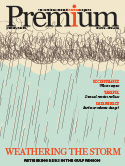Regulatory risk gains prominence: Report

Regulatory risk is growing for reinsurance companies, which could represent a mix of favorable and unfavorable changes for offshore domiciles should US tax reforms be adopted, according to a new A.M. Best briefing.
The Best’s Briefing, titled, Shifting Tides in Global Regulation Present Challenges and Opportunities, states that should tax and regulatory changes result in lower after tax earnings, organisations would likely respond by finding alternative operating structures to sustain earnings and manage capital cost efficiently. This also could potentially lead to the decline of one domicile over another.
With the new US administration in place, lowering the corporate tax rate and taxes on imports remain on the table, as they were among President Donald Trump’s campaign promises, intended to bring business back onshore to stimulate the US economy. According to the briefing, this would benefit US reinsurers; however, Bermuda and other offshore domiciles could be negatively impacted, and they have cited the risks of less capacity and higher rates to US consumers in their opposition.
In January 2017, the US and the European Union announced a bilateral agreement regarding insurers and reinsurers, which provides for mutual recognition in the areas of reinsurance, group supervision and exchange of information. A key provision of the agreement is the elimination of the requirement for an assuming reinsurer in either jurisdiction to post collateral to a cedant in another jurisdiction, subject to certain conditions. In a market with abundant capacity, the reduction of collateral requirements could result in more pressure on rates or terms and conditions from increased competition.
The risk of changes in the regulatory environment is just one component in an organisation’s enterprise risk management framework, and the potential change in tax structure or treatment of internal reinsurance is not a new concept for the reinsurance industry states the report.





































